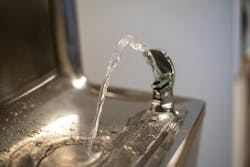Colorado receives ‘C+’ for efforts to remove lead from schools’ drinking water
The latest Get The Lead Out study for Colorado, found that the state earned a C+ grade based on its policies to stop lead contamination of schools’ drinking water, according to a press release by the CoPIRG Foundation.
Colorado had jumped up from an F grade in the previous study by taking incremental policy steps toward safer drinking water for children at schools. This is the third edition of the Get The Lead Out study, which is lead by the CoPIRG Foundation and Environment Colorado Research and Policy Center.
The groups gathered outside the state Capitol to highlight the opportunity that school districts have to adopt additional filter-first policies and use state and federal resources to exceed state actions, extending protections to more kids across the state.
“Kids in Colorado deserve the opportunity to drink clean water while learning and playing at school every day,” said CoPIRG public health advocate Alex Simon. “While last year’s bill was an important step in the right direction, protecting our kids’ health requires prevention at every drinking water tap — something school districts can do with additional policy action and capitalizing on state and federal money.”
A 2021 study found that 72% of Colorado children under 6 who were tested had detectable levels of lead in their blood – well above the national rate of 51%.
In most states that have tested a significant percentage of schools and made that data public, roughly half of the schools tested found lead at one or more taps. In Colorado, only seven school districts had conducted lead testing through a statewide grant program as of September 2021, with data available on the CDPHE website.
Under recently passed state law, elementary schools and most child care facilities are required to test drinking water sources and post results publicly by June 1, 2023.
HB22-1358 provides funding to school districts for remediation — but the law only requires addressing taps where testing confirms lead concentrations in water above 5 parts per billion, allowing for significantly more lead in the water than the 1 ppb recommended for children by the American Academy of Pediatrics. Furthermore, lead concentrations in water are highly variable, and even proper sampling can miss lead contamination or fail to capture its full extent. The CoPIRG Foundation says that these “Test and fix” policies are a main reason why the state earned a C+.
CoPIRG Foundation’s report strongly recommends installing filtered water stations, which eliminates a common source of lead (fountains replaced) and also captures lead coming from plumbing or pipes. The foundation says that such measures would only cost a small fraction of the federal funding Colorado schools are already receiving.
A more complete picture of lead contamination statewide will emerge this summer, as local schools and most child care facilities are required to publicly report lead testing results in June.
